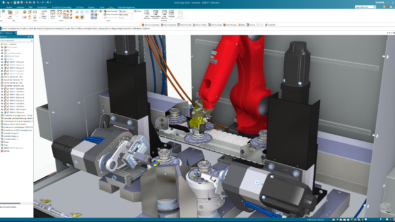Virtual Mentoring From Siemens PLM
A pilot group of 10 high school classrooms participating in the Southern Regional Education Board’s (SREB) Advanced Career (AC) curriculum is tapping into new expertise via “virtual mentors” from industry giants Siemens and National Instruments Corporation.
Students taking AC pathway courses study college-readiness academic content while completing hands-on, project-based assignments using Siemens Solid Edge CAD software, and National Instrument LabView software. They work in teams to research and develop solutions to project problems, then present their findings. Each four-course pathway is developed with direct industry involvement and allows students to communicate with and ask questions of experienced professionals.
SREB is establishing a Web-based network of mentors from approved companies, which Siemens PLM and National Instruments will help pilot, and hopes to attract more mentors from companies in high-demand, high-wage fields that are important to state and national economies.
Mentors are not a substitute for teachers and do not directly help the teams solve problems. Instead, they are content specialists who support the student team with advice and counsel. Students can request feedback about the problem statement, design solution, research findings, final report and presentations. Weekly communications are monitored through teachers’ email accounts.
Bruce Hamrick, who leads AC’s Integrated Production technologies curriculum at the Carver Career and Technical Center in Kanawha, West Virginia, hopes virtual mentoring will help his students gain a better understanding of class projects and how each relates to work in a manufacturing setting. “I hope that it helps my students develop better communications skills as well as [gain] a better understanding of 21st-century skills needed for careers and/or postsecondary education.”
Hamrick adds, “I do think that the students will get real world experience by establishing communications with a mentor in the industry. It will help encourage and motivate students.”
Corporate involvement with high schools has proven to be a win-win for schools, students and participating industries. The pilot is being conducted in four AC pathways: Clean Energy Technology, Energy and Power, Innovations in Science and Technology, and Integrated Production Technologies. The other four AC pathways are Aerospace Engineering, Global Logistics and Supply Chain Management, Health Informatics, and Informatics. SREB and states are recruiting virtual mentors for these pathways. Each pathway contains four courses of increasingly challenging industry-based projects for students in grades nine through 12 and continued learning in work and postsecondary 9-14 programs.
Siemens PLM customers looking for additional information or who are interested in becoming a virtual mentor themselves, please contact Matt Bruce.
About SREB:
The Southern Regional Education Board works with 16 member states to improve public education at every level, from pre-K through Ph.D.
SREB is a nonprofit, nonpartisan organization headquartered in Atlanta. Member states are Alabama, Arkansas, Delaware, Florida, Georgia, Kentucky, Louisiana, Maryland, Mississippi, North Carolina, Oklahoma, South Carolina, Tennessee, Texas, Virginia and West Virginia. SREB’s work is funded by member appropriations and by grants and contracts from foundations and local, state and federal agencies.
The Board includes the governor and four gubernatorial appointees from each member state, including at least one state legislator and one educator. The Legislative Advisory Council of legislators from each state advises the Board.
SREB was created in 1948 by Southern governors and legislators who recognized the link between education and economic vitality. To this day, the organization maintains its focus on critical issues that hold the promise of improving quality of life by advancing public education. The region’s track record shows that setting goals and maintaining the commitment to work toward them can make a difference.
The nation’s first regional interstate compact for education, SREB is today the most comprehensive, working directly with state leaders, schools and educators.



Comments